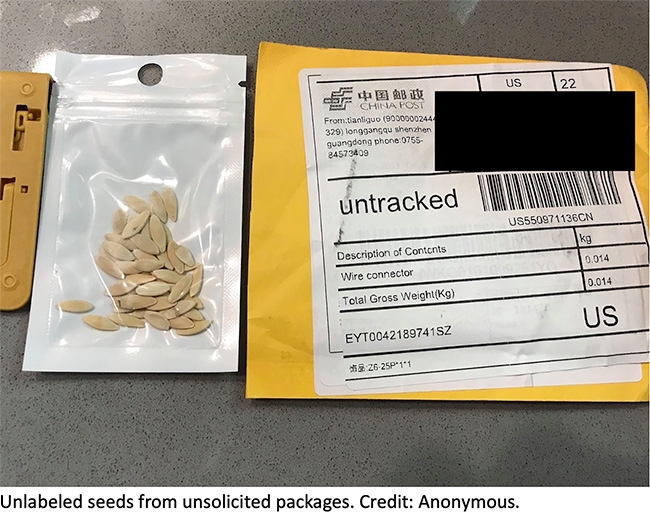By Julie Clark, Community Education Specialist III
Goldspotted borer (GSOB) is a beetle invasive to oaks in California. Infestations have ravaged oak woodlands in San Diego and Riverside counties the last 12 years and in Anaheim Hills, Angeles and San Bernardino National Forests the last few years. Preferred hosts are black oak, canyon oak, coast live oak, and occasionally Engelmann oak.
Oak woodlands are highly valued ecosystems that support numerous species of fauna. Oak trees serve as the anchor for these systems and support over 5000 insect species, over 105 bird species, 105 mammal species, 58 species of amphibians and reptiles during their respective life cycles. Many beneficial insects rely on oaks to complete their life cycles and do not damage the trees in doing so.
GSOB bore into the bark of its hosts to lay eggs and rear young. Mature beetles emerge to find new hosts. The adults leave a distinctive D-shape hole in the bark upon exit. 
The insects damage the water and food transfer structures (xylem and phloem) of the tree, causing crown die-back and eventual death in heavily infested (amplifier) trees. Widespread loss of oaks from GSOB has occurred in Idyllwild and San Diego County mountain areas.
Although GSOB are winged, they do not fly long distance. UC researchers, partners with CAL FIRE and the California Firewood Task Force discovered that several of the infestations throughout Southern California were caused by introduction of firewood imported from infestations in other areas. 
D-shaped GSOB exit holes. Credit: UC ANR
Ventura County is vulnerable to attack by the beetle and other invasive tree pests that are on watchlists for the area. Best ways of being assured your firewood is safe include purchasing locally source material or selecting kiln-dried or certified firewood.
For more information:
Report suspected GSOB infestation:
https://ucanr.edu/sites/gsobinfo/What_You_Can_Do/Report_GSOB_Symptoms/
- Author: UC Integrated Pest Management
Have you had unexpected seeds show up in the mail? Unknown seeds could be invasive plants, contain invasive insects, or have plant disease causing agents. Here's what the United States Department of Agriculture Animal Plant and Health Inspection Service (USDA APHIS) has to say about it.
USDA Investigates Packages of Unsolicited Seeds
USDA is aware that people across the country have received suspicious, unsolicited packages of seed that appear to be coming from China. USDA's Animal and Plant Health Inspection Service (APHIS) is working closely with the Department of Homeland Security's Customs and Border Protection, other federal agencies, and State departments of agriculture to investigate the situation.
USDA urges anyone who receives an unsolicited package of seeds to immediately contact their State plant regulatory official or APHIS State plant health director. Please hold onto the seeds and packaging, including the mailing label, until someone from your State department of agriculture or APHIS contacts you with further instructions. Do not plant seeds from unknown origins.
At this time, [USDA does not] have any evidence indicating this is something other than a “brushing scam” where people receive unsolicited items from a seller who then posts false customer reviews to boost sales. USDA is currently collecting seed packages from recipients and will test their contents and determine if they contain anything that could be of concern to U.S. agriculture or the environment.
USDA is committed to preventing the unlawful entry of prohibited seeds and protecting U.S. agriculture from invasive pests and noxious weeds. Visit the APHIS' website to learn more about USDA's efforts to stop agricultural smuggling and promote trade compliance.
- Author: Cris L. Johnson

The University of California, Agriculture and Natural Resources (UC ANR) division is celebrating 100 years of service and science to the state of California. In May 2014 UC ANR will mark the 100th anniversary of the Smith-Lever Act, legislation that created Cooperative Extension, a nationwide system of community-based education, established as part of each state's land grant university.
The Ventura County UC Cooperative Extension is our local component of this structure where we serve the community through youth development programs, agricultural outreach and research, home gardening programs, natural resource education and projects, environmental horticultural and landscape expertise. We also work in conjunction with the Hansen Agriculture UC Research and Extension Center (REC) in Santa Paula where agricultural research projects and educational outreach programs are conducted in a dedicated agricultural setting.
Join us at our 100th anniversary celebratory meeting in Oxnard and learn more about the extension and research activities.
Date: January 29, 2014
Time: 8:00 am to Noon
Location:
Courtyard by Marriott
600 E. Esplande Dr.
Oxnard
RSVP by January 20, 2014 to 805-525-3839, ext. 214 or sbmiller@ucanr.edu or respond online.




